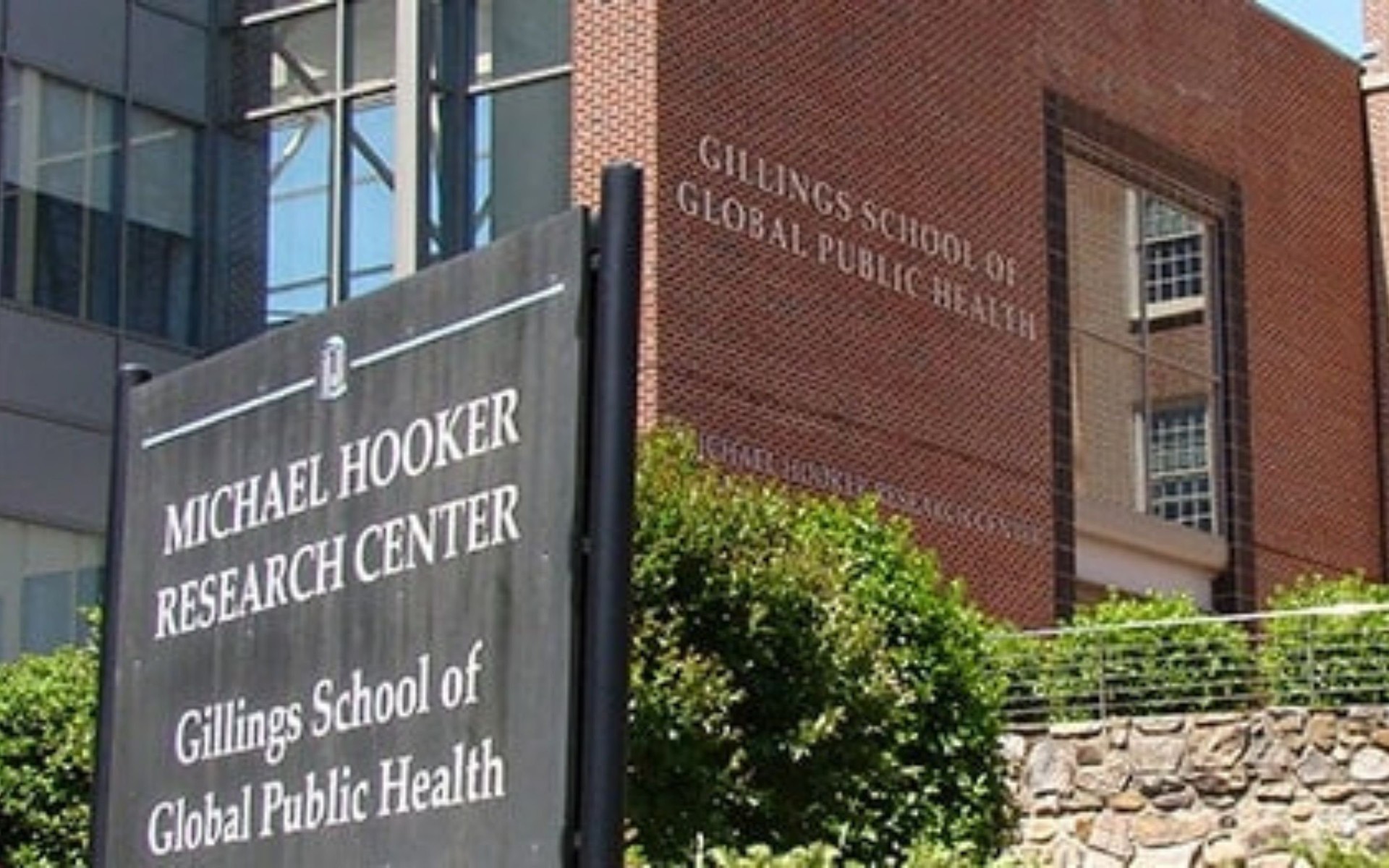Partner Spotlight
Rise of the “Disease Detectives”: Faculty Shed Light on UNC’s New Online Concentration in Applied Epidemiology
Written by Bannon Puckett on Jul 6, 2021
Related content: Graduate Programs

In the University of North Carolina (UNC) at Chapel Hill’s Gillings School of Global Public Health, there’s a lot to be excited about this summer. For 2021, U.S. News and World Report rated UNC Chapel Hill the nation’s #1 public school for Public Health and #2 overall. Its Department of Epidemiology remains one of the world’s largest and most highly regarded academic departments for study in the discipline. And beginning this fall, in addition to Leadership and Nutrition, UNC is adding Applied Epidemiology as a third concentration to its online Master of Public Health (MPH) program, powered by 2U.
With MPH applications soaring in part due to the health career surge brought on by COVID-19, UNC’s Applied Epidemiology concentration surveys a wide spectrum of other public health topics, too: cardiovascular disease, HIV, environmental exposures, the opioid epidemic, suicide rates, HPV vaccination, and cancer treatment efficacy among them. Students learn to understand public health surveillance systems, recommend and implement study designs, conduct analyses in order to address research questions, and then communicate their findings to a variety of audiences.
“Prior to COVID, there was already a field-wide re-orientation in the MPH world, and in our department, toward training more applied professionals to populate our public health workforce,” says Dr. Stephanie Engel, a professor and associate chair of the Department of Epidemiology. “But over the last year and a half, the entire world has witnessed the essential role that applied public health professionals play in ensuring that the public is safe, well-informed, and able to conduct the business of their lives, knowing which behaviors are risky and which are OK.”
The pandemic exposed gaps already present in the workforce and made them worse. Given this is such a critical role, we’ve worked with 2U to add our Applied Epidemiology concentration to the online MPH program so that we can have a much larger footprint.— Dr. Stephanie Engel, professor and associate chair of the Department of Epidemiology, UNC Chapel Hill
“All of that requires skilled professionals collecting data appropriately and sharing it with their constituencies,” Dr. Engel continues. “The pandemic exposed gaps already present in the workforce and made them worse. Given this is such a critical role in public health, we’ve worked with 2U to add our Applied Epidemiology concentration to the online MPH program so that we can have a much larger footprint in this area.”
Dr. Karin Yeatts, an associate professor in the department and the concentration’s faculty lead, elaborates: “We’re training groups of people how to accurately collect, interpret, and communicate evidence-based public health data and work with different communities to help them combat misinformation and advocate for change. Many of these tools can also be used to highlight injustices that have accumulated over time and rectify them through strong evidence-based solutions.”
World-Class Curriculum Delivered Online
The curriculum within the online Applied Epidemiology concentration is essentially the same as that of the residential program, Dr. Engel explains. “The first course in the concentration sequence will be led by an outstanding researcher and methodologist, Dr. Daniel Westreich, who just published a book on foundational epidemiology methods,” she says. “His book is being adopted by a number of training institutions across the U.S. Through the curriculum, we’re teaching students skills they can use right away in their practice, including training in statistical programming that's essential for an applied professional today in the same way it is in the research field.”
“Because of the fast-paced nature of research, the information can change from one week to the next,” Dr. Yeatts adds. “So the examples such as COVID that instructors bring to discuss in class, and the areas that students explore in their research projects, tend to be very topical and timely.”
“We don’t want to just be preparing students to address the problems we already have,” Dr. Engel says. “We also want to get them thinking about what the next problem might be. COVID has obviously provided salient examples for many of the concepts we teach, because each and every one of us has just experienced it. But chances are we're going to have another event at some point in the future, and next time it may or may not be a coronavirus. So our program hits a broad swath of topics to give students that breadth.”

As the concentration’s faculty lead, Dr. Yeatts has been working closely with her UNC colleagues as well as the 2U Course Development team to translate the program’s world-class curriculum to a digital environment. “Several of our faculty have been in the process of adapting their courses for online instruction and filming their asynchronous materials,” she says. “2U has been very professional and organized through it all.”
She continues: “With the applied track online, we can now reach people who’d love to get the degree but otherwise can’t afford to go unemployed for two years in order to study full-time. 2U is helping us meet the needs of working professionals who can work toward their master’s degree on a more extended time scale and then bring those newly acquired skills and experiences to their workplace.”
Epidemiology: Endless Career Possibilities
When it comes to careers in the discipline, Dr. Engel says that most people think state departments of public health. “But there are epidemiologists in all corners of public and private enterprise doing all kinds of things,” she says. “For example, I’m a reproductive and developmental epidemiologist, so I do a lot of work with adverse birth outcomes and neuro-developmental disabilities. Here in North Carolina and across the nation, epidemiologists use state-generated vital records data to understand what causes people to have birth defects and what types of disparities in pregnancy outcomes exist in the U.S. That’s my personal bread and butter, but it’s just one example of the critical public health data generated by us.”
2U is helping us meet the needs of working professionals who can work toward their master’s degree on a more extended time scale and then bring those newly acquired skills and experiences to their workplace.— Dr. Karin Yeatts, associate professor and faculty lead for the Applied Epidemiology concentration, UNC Chapel Hill
Dr. Yeatts points to recent graduates of their 2021 residential concentration cohort as further examples of career possibilities. “Where students go is incredibly diverse,” she says. “One of our graduates is going to be a fellow at the Council of State and Territorial Epidemiologists. He was assigned to the Bureau of Tuberculosis Control at the NYC Department of Health and Mental Hygiene, where he’ll work closely with health department officials on pressing problems. Another graduate was hired by Deloitte to help design the Ukraine Ministry of Health’s National Framework for Preparedness. And then there are three graduates who liked the program so much that they’ve decided to continue on with us and pursue a Ph.D.”
“There are also a lot of epidemiologists who consult for companies to help them respond to issues that affect their people and their business,” Dr. Engel adds. “In the future, we may well have epidemiologists employed in-house at companies outside of the healthcare sector. I also know that epidemiologists work for the National Park Service, for example. They’re responsible for tracking and developing mitigation strategies for communicable diseases transmitted within park boundaries. They also survey different types of injuries that occur in the parks and design ways for the parks to interface with visitors so that they’re safer. Epidemiology truly is a diverse kind of job.”
From COVID to Cancer to Hurricanes
In the Applied Epidemiology concentration, students have several opportunities for exploring career opportunities available to them. “One is through their practicum,” Dr. Engel explains, “which lets them work in the field and gain more exposure to an area of interest. We’ve had students placed in UNC’s Comprehensive Cancer Center, for example, focused on community engagement work.”
Another way that students investigate their future pathways is through ongoing and culminating research projects. Dr. Yeatts—whose academic research is respiratory disease and air pollution—recalls a recent capstone project with some of their residential graduates. “They worked on a data set collected from one of the hurricanes that have swept through North Carolina,” she says. “One student team looked at the data with more of a medical focus, one team was more environmentally focused, and another team was more social and maternal child health focused. That’s just one example of how the program allows for so many variations, even around the same concept, based on where students want to take their knowledge and curiosity.”

“Oftentimes in the program,” Dr. Yeatts continues, “the discussions we have in class compel me to reflect on my own thinking and modify it based on some great points that students make. This past spring, a lot of that was related to COVID, such as anti-vaccination sentiment, and the talks were powerful and eye-opening. Watching our students develop as public health professionals—even just hearing one of them talk about something in accurate ‘epi language’—is so exciting and validating to me. There are so many ‘armchair epidemiologists’ out there who get it wrong and they’re doing a disservice to their communities and to the world at large. Our students are actively learning how to collaboratively make the most intelligent and informed decisions about today’s most pressing public health issues based on evidence-based science and data.”
Interested to learn more about the Applied Epidemiology concentration? Learn more here; the application deadline for September’s online cohort is Tuesday, July 13.
Latest.
Learn more about us.
At 2U, we’re on a mission—to eliminate the back row in higher education and help universities thrive in the digital age. To learn more about who we are and what we do, follow the links below.